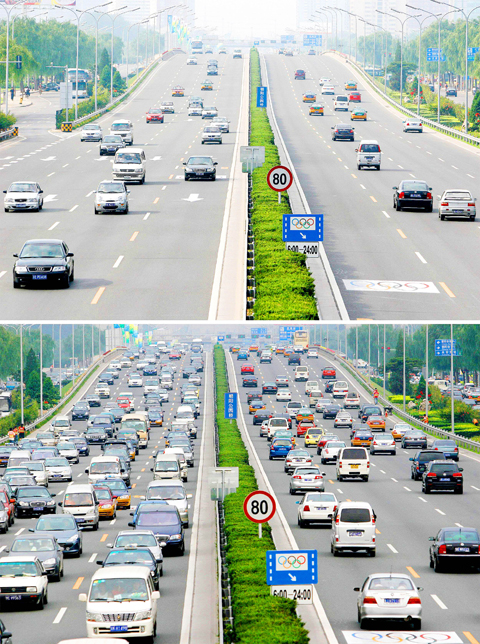Beijing’s bold plan to restrict car use to clear its notoriously polluted skies in time for the Olympics moved into high gear yesterday as the work week began.
Normally snarled traffic flowed smoothly in most areas, although skies were hazy, a sign that it could be several days before the impact of the measures — which also include constructions cutbacks and factory closures — is noticeable.
Under the two-month operation that started on Sunday, half of the capital’s 3.3 million cars will be removed from city streets on alternate days depending on whether their license plates end in an odd or even number.

PHOTO: AP
Sun Weide (孫維德), spokesman for Beijing’s Olympic organizing committee, said the plan should reduce vehicle emissions — a major cause of the city’s stifling pollution — by about 63 percent. He did not give further details.
Sun said that experts from the city’s environment protection bureau would monitor changes in the level of air pollution.
Already, “it can be easily felt that traffic is less heavy now and the number of vehicles on the road is clearly smaller,” Sun said. “We predict that we could achieve our goal.”
Foreign experts say the plan could still go wrong because unpredictable winds might blow pollution from other provinces into Beijing, or a lack of wind — common in August — could enable local pollution to build up.
Yesterday, traffic moved at a steady pace along main thoroughfares and highways.
“Before we would be at a dead standstill,’’ a taxi driver who would give only his surname, Zhang, said. “Now it’s better.”
Drivers with even-numbered plates were forced to take public transportation, where crowds remained surprisingly manageable.
“It seems that the subway isn’t as busy as I expected. There are fans and air conditioning, so you don’t feel very hot,” said Chen Songde, who normally drives to work in Beijing.
In addition to the traffic plan, chemical plants, power stations and foundries had to cut emissions by 30 percent beginning on Sunday.
Dusty, noisy construction in the capital had to stop entirely.
Those caught driving on days they shouldn’t would be fined 100 yuan (US$14), a pricey penalty even for the capital.
On many days, Beijing’s skyline can barely be seen because of a thick, gray-brown haze that hangs over the city.
Already, many competitors in the Aug. 8 to Aug. 24 Olympics are choosing to train outside of Beijing, and International Olympic Committee president Jacques Rogge has said outdoor endurance events lasting more than an hour will be postponed if air quality is poor.
The world’s greatest distance runner, Haile Gebrselassie of Ethiopia, has bowed out of the marathon event because the city’s pollution irritates his asthma.
Some 300,000 heavily polluting vehicles — aging industrial trucks, many of which operate only at night — were banned starting July 1.

POLITICAL PRISONERS VS DEPORTEES: Venezuela’s prosecutor’s office slammed the call by El Salvador’s leader, accusing him of crimes against humanity Salvadoran President Nayib Bukele on Sunday proposed carrying out a prisoner swap with Venezuela, suggesting he would exchange Venezuelan deportees from the US his government has kept imprisoned for what he called “political prisoners” in Venezuela. In a post on X, directed at Venezuelan President Nicolas Maduro, Bukele listed off a number of family members of high-level opposition figures in Venezuela, journalists and activists detained during the South American government’s electoral crackdown last year. “The only reason they are imprisoned is for having opposed you and your electoral fraud,” he wrote to Maduro. “However, I want to propose a humanitarian agreement that

ECONOMIC WORRIES: The ruling PAP faces voters amid concerns that the city-state faces the possibility of a recession and job losses amid Washington’s tariffs Singapore yesterday finalized contestants for its general election on Saturday next week, with the ruling People’s Action Party (PAP) fielding 32 new candidates in the biggest refresh of the party that has ruled the city-state since independence in 1965. The move follows a pledge by Singaporean Prime Minister Lawrence Wong (黃循財), who took office last year and assumed the PAP leadership, to “bring in new blood, new ideas and new energy” to steer the country of 6 million people. His latest shake-up beats that of predecessors Lee Hsien Loong (李顯龍) and Goh Chok Tong (吳作棟), who replaced 24 and 11 politicians respectively

Young women standing idly around a park in Tokyo’s west suggest that a giant statue of Godzilla is not the only attraction for a record number of foreign tourists. Their faces lit by the cold glow of their phones, the women lining Okubo Park are evidence that sex tourism has developed as a dark flipside to the bustling Kabukicho nightlife district. Increasing numbers of foreign men are flocking to the area after seeing videos on social media. One of the women said that the area near Kabukicho, where Godzilla rumbles and belches smoke atop a cinema, has become a “real

‘WATER WARFARE’: A Pakistani official called India’s suspension of a 65-year-old treaty on the sharing of waters from the Indus River ‘a cowardly, illegal move’ Pakistan yesterday canceled visas for Indian nationals, closed its airspace for all Indian-owned or operated airlines, and suspended all trade with India, including to and from any third country. The retaliatory measures follow India’s decision to suspend visas for Pakistani nationals in the aftermath of a deadly attack by shooters in Kashmir that killed 26 people, mostly tourists. The rare attack on civilians shocked and outraged India and prompted calls for action against their country’s archenemy, Pakistan. New Delhi did not publicly produce evidence connecting the attack to its neighbor, but said it had “cross-border” links to Pakistan. Pakistan denied any connection to